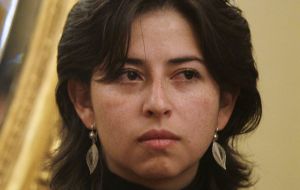MercoPress. South Atlantic News Agency
Bolivian Indians defending their lands expose divisions in Morales government
 Defence minister Cecilia Chacon resigned to protest the heavy hand of the police
Defence minister Cecilia Chacon resigned to protest the heavy hand of the police Bolivia's Defence minister resigned on Monday to protest a police crackdown and arrests on anti-highway demonstrators which according to unconfirmed reports also caused the death of a baby and several disappeared.
The month-long protest over plans to build a 300 km highway through the Amazon forest is proving most uncomfortable for Morales because it was led by Indian communities who normally back his pro-indigenous reforms.
Police broke up the march late on Sunday, firing tear gas and detaining protesters when they raided a camp used by the 2.000 demonstrators and their families in the Yucumo region 300 km north of La Paz, local media said.
Several people suffered minor injuries, according to local media reports, and the crackdown was criticized by opposition politicians, the ombudsman and several government officials including Defence Minister Cecilia Chacon.
“This is not the way! We agreed to do things differently,” Chacon wrote in her resignation letter, which was published by Bolivian media.
Protestors claim one baby and 37 people are disappeared including seven children (who apparently fled into the jungle when the police attack), according to Andres Gomez head of the Bolivian network of indigenous community radio stations.
The Bolivia Catholic church later confirmed the death of a baby, although circumstances are not clear.
Communications Minister Ivan Canelas said police had no choice but to act. “The march was defused because it had become a source of violence,” he said.
“We deeply regret what has happened because all along we have been calling for a peace and dialogue solution to the conflict and these incidents of violence are really deplorable”, said in La Paz United Nations delegate Yoriko Yasukawa.
Bolivia’s ombudsman Rolando Villena also condemned the police action saying there was “excessive use of force and the rights to free association and expression as well as the right to free transit were ignored.
On Saturday, Bolivian Foreign Affairs minister David Choquehuanca was retained and forced to walk with the demonstrators for several hours while an Indians council demanded that the Bolivia government drop the road project and clear the way for protestors to continue their march.
It was later reported that the police action targeted the arrest of Indian leaders who were then to be bussed to a nearby airport and flown back to their original towns. However marches later surrounded the buses and occupied the air strip forcing the police to set free all the arrested, some of them injured with their heads bashed with batons.
Bolivia's first president of indigenous descent, Morales has put the controversial 420 million dollars highway (financed by Brazil) at the heart of his drive to boost infrastructure in the land locked Andean country.
But fierce opposition to the project from local indigenous leaders has tested his commitment to conservation and exposed differences within his Movement Toward Socialism party.
Some MAS lawmakers expressed support for the demonstration and the demands of the 12,000 residents of the Isiboro Secure Indigenous Territory and National Park, through which the planned road would be built.
Morales angered activists in June by saying the road would be built through the territory and park “whether they like it or not.”
Seeking to defuse tension over the road, Morales said at the weekend that a referendum would be held in the provinces to be linked by the road “so the people can decide whether the project should go ahead or not.”
Morales is highly popular among the Quechua and Aymara indigenous majority in the Andean highlands, but opposition to his policies is strong in eastern lowlands, even among indigenous groups including TIPNIS Indians and the Guarani.
Morales public opinion support has plummeted to 37% since the conflict started which is the lowest since taking office in 2006.




Top Comments
Disclaimer & comment rules-

-

-

Read all commentsMorales is an indian, and the indians do not want the road to development.
Sep 27th, 2011 - 02:07 pm 0If this is the path they choose, then forest paths to a more settled and rural life is the way Bolivia must go.
No President is bigger than his/her people
- except Chavez, perhaps.
This scenery is well known in some south american countries where the country's natural resources are located on the indigenes lands or areas.
Sep 27th, 2011 - 02:24 pm 0So, all its citizens are against new infrastructures, becuase they are the least to receive its benefits to the contrary, they get the opposite of it, wich is health problems, food and animal contamination.
Most dignitaries from countries on this region, fell to comunicate effectively with its indigenan population ,because promises are not met as they were told innitialy.
Long history repeats againg and again, which indicates descomfort so local citizens opposite due to the fact that major infrastructures are not hospitals nor schools, just highways which obstacles their way of living.
Since the 2nd century BC, when the transcontinental Silk Road opened up the Chinese hearthlands to the hinterlands, roads into the hearts of darkness change the worlds of peoples forever.
Sep 27th, 2011 - 06:58 pm 0Today, Zhang Qian is considered a national hero and revered for the key role he played in opening China to the world of commercial trade.
Will Morales be the contemporary Zhang and bring high-rise to the hearthland, or will the desire for isolation prevail?
It is entirely a matter of perspective, which is the route to better quality of life.
Commenting for this story is now closed.
If you have a Facebook account, become a fan and comment on our Facebook Page!